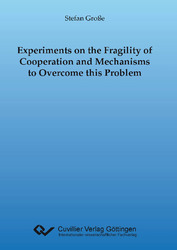| Departments | |
|---|---|
| Book Series (96) |
1380
|
| Nachhaltigkeit |
3
|
| Gesundheitswesen |
1
|
| Humanities |
2369
|
| Medienwissenschaften | 16 |
| Theology | 57 |
| Philosophy | 102 |
| Law | 422 |
| Economics | 851 |
| Social sciences | 418 |
| Sports science | 48 |
| Psychology | 233 |
| Educational science | 190 |
| History | 183 |
| Art | 111 |
| Cultural studies | 166 |
| Literary studies | 117 |
| Linguistics | 88 |
| Natural Sciences |
5408
|
| Engineering |
1794
|
| Common |
98
|
|
Leitlinien Unfallchirurgie
5. Auflage bestellen |
|
Advanced Search
Experiments on the Fragility of Cooperation and Mechanisms to Overcome this Problem (English shop)
Stefan Große (Author)Preview
Table of Contents, Datei (72 KB)
Extract, Datei (170 KB)
In experimental economics cooperation is frequently modeled
by a so-called public-good design. This design tries to depict the
problem that cooperation is benefi cial for every participant but
that there are individual incentives to free-ride, i.e., to invest no
personal effort to increase the common welfare. In public-good
experiments cooperation usually breaks down due to imperfect
conditional cooperation if measures like sanction possibilities,
reputation-building or communication are absent.
We contribute to the literature in a number of ways. For example
we introduce a new dynamic public-good design to analyze
whether subjects behave differently when they do not receive
new resources in a multiperiod public-good design. We further
provide a monitoring mechanism that mitigates the free-riding
problem, in the fi rst study with a linear and in a second study
with a non-linear production function. However, the costly
implementation of the monitoring in itself represents either a
(second-level) step-level public-good or a second-level linear
public-good in the latter case. Finally we introduce a limit on
punishment.
| ISBN-13 (Printausgabe) | 3869558172 |
| ISBN-13 (Hard Copy) | 9783869558172 |
| ISBN-13 (eBook) | 9783736938175 |
| Final Book Format | A5 |
| Language | English |
| Page Number | 140 |
| Lamination of Cover | matt |
| Edition | 1 Aufl. |
| Volume | 0 |
| Publication Place | Göttingen |
| Place of Dissertation | Universität Erfurt |
| Publication Date | 2011-07-15 |
| General Categorization | Dissertation |
| Departments |
Economics
|








